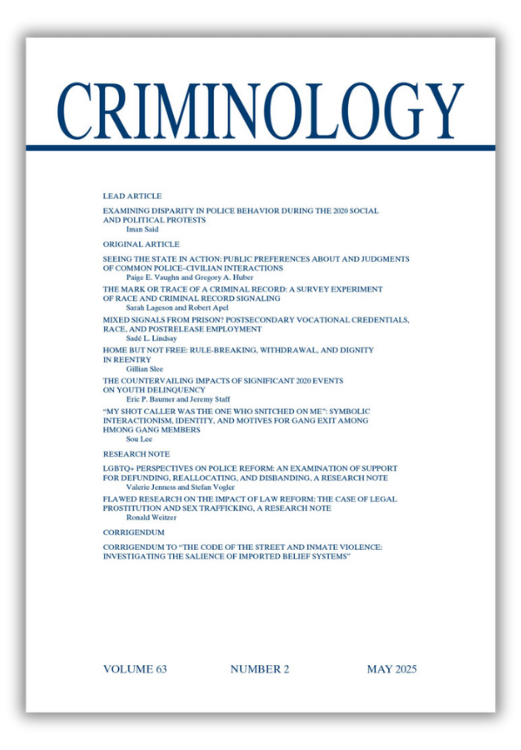The top editors of a criminology journal have stepped down after the society in charge of the publication assessed concerns about manuscript review times.
The board of the American Society of Criminology decided “a change of leadership was required due to some ongoing operational issues with the Criminology journal,” according to an announcement on the society’s website. “We appreciate the contributions of the prior editors.”
Kelly Vance, associate director of the society, said the organization had no further comment beyond the announcement.
The previous editors, Volkan Topalli of Georgia State University in Atlanta and Thomas Loughran of the University of South Florida in Tampa, started their terms last year and were due to continue until 2029. In an email to Retraction Watch, Topalli stated he and Loughran were not removed from their roles, but “stepped down.” They declined to comment further for this story.
In a letter addressed to Criminology’s editorial board obtained by Retraction Watch, Topalli, Loughran, and three other editors wrote they had decided to resign “due to an unworkable relationship with the current Executive Board.”
The former editors cited “fundamental differences” of opinion about how to run the journal, concerns about conflicts of interest and ethical issues, and “lack of honest and collegial communication” with the society’s board. They had submitted documentation of their concerns to other society committees, as well as the Committee on Publication Ethics, they wrote.
Topalli confirmed the content of the letter and declined to comment further.
The society’s leadership has recently acknowledged concerns about review times at the journal. In the July/August 2025 issue of The Criminologist, the American Society of Criminology’s newsletter, three members of the 2024 ethics committee published an article analyzing review times at the society’s two scholarly journals as reported to the organization’s leadership.
Between 2008 and 2022, the average review time for manuscripts at Criminology was 59 days, they reported. The single longest review time in the period was 185 days.
The average review time was not available for 2023. Instead, the authors reported median review times, which increased from 45 to 83 days from 2022 to 2023 for all articles, including desk rejections. For only articles sent for review, the authors found the median review time increased from 54 to 99 days in those years. The longest review time in 2023 was 388 days, for an article that received a desk rejection, they wrote.
In a response article published in the same issue, Topalli and Loughran described the journal’s editorial process in detail and acknowledged “longer than desirable wait times” in 2023, their first year editing the journal. They attributed the issue to implementing new processes, a larger-than-ever number of submissions, the difficulty of finding reviewers, and the need to conduct two “time-consuming” investigations of articles. They also noted Wiley, the publisher of the journal, went through a reorganization “which left us without a publisher contact for over a month.”
Topalli and Loughran charged that the article on review times focused on “outliers” of “greatly delayed” reviews. They also made process changes since 2023, they said, after which review times for desk rejections “plummetted.” They presented data on review times for desk rejections in the first quarter of 2025 they said demonstrated a “far less problematic” performance than the original article indicated.
In the first three months of 2025, the mean number of days for a decision was 40.8, and desk rejections took 5.9 days, on average, Topalli and Loughran wrote.
A message at the end of the article and response read: “The ASC Executive Board has been aware of concerns raised about the review times for Criminology. In response, the Board assessed review times and, following a dialogue with the Editors of Criminology, is in the process of taking corrective steps.”
In a rejoinder published in the September/October issue of The Criminologist, the first author of the article on review times, Justin Pickett of the State University of New York at Albany, defended the analysis and presented data from Wiley on the journal’s median review times from 2020 to 2024. In contradiction to the numbers the editors supplied, he wrote, the official statistics “did not improve meaningfully in 2024.”
Like Retraction Watch? You can make a tax-deductible contribution to support our work, follow us on X or Bluesky, like us on Facebook, follow us on LinkedIn, add us to your RSS reader, or subscribe to our daily digest. If you find a retraction that’s not in our database, you can let us know here. For comments or feedback, email us at [email protected].

So, did this impact the results?
What? The medians are very reasonable. Nowadays, it is increasingly common that you get first reviews after about a year. And not only that: the reviewing quality too is increasingly poor, including LLM slop passed as “reviews”. But don’t blame the volunteering editors; they often have to spam tens of people to get a single low-quality review. And the LLM slop submitted as “research” has made the problems much worse.
This is a disappointing development. This editorial team’s work was the first high-profile attempt to introduce much-needed open science principles in criminology, but there is much more to do. I hope that the ambitious changes the team introduced will survive a change in leadership.